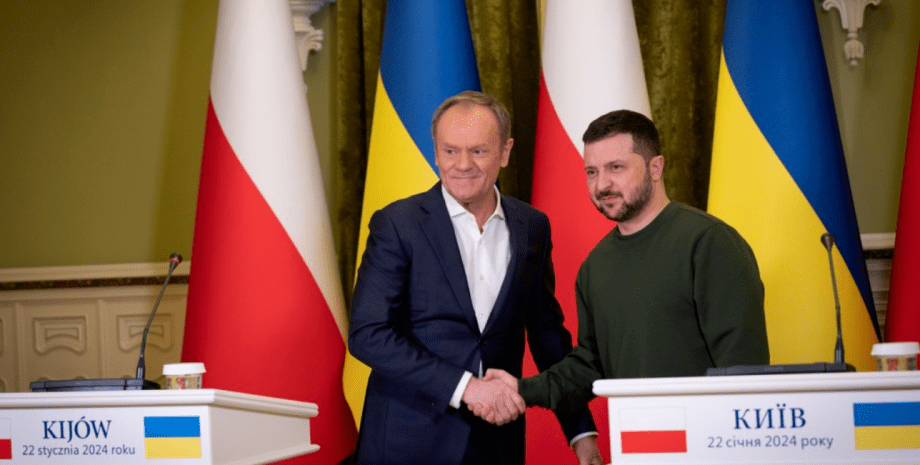
 By Eliza Popova
By Eliza Popova
So, last week, the Polish head of government stated that it would consider the possibility of national legislation on the ban on Russian and Belarusian imports, since they, like Ukrainian goods, destabilize the markets of Poland and the EU. On Monday, March 4, according to experts of the publication, he retreated, announcing that the prohibition at the level of the entire EU would seek instead.
"The irreversible actions of the Polish Prime Minister are forcing experts and the international community to think about whether he really knows how to suppress farmers' riots, whether he simply pours oil into fire," Politico questions. First of all, according to experts of the publication, there is no evidence that would confirm the assertion of Tusk that Russian (or even Ukrainian) imports are to blame for the troubles of Polish farmers.
Recently, another EU country - Latvia - insisted on a universal ban on agricultural imports from Russia, but failed after other EU countries stated that it would be too expensive. According to Yakub Olipra, the senior economist Credit Agricole Bank Polska, Tusk makes all these statements simply to "show farmers that something is being done. " In fact, he emphasizes, they have no practical importance.
And while Tusk fails, the anger of Polish farmers, who on March 6, conduct a large -scale protest in the capital, deepens the split between Warsaw and Kiev, and the only winner of this trade war, according to Politico analysts, is Russian President Vladimir Putin. "This is how it produces the power of Russia as the leading world exporter of grain and uses it to isolate Ukraine," the publication emphasizes.
Despite the existing ban on importing Ukrainian grain, Polish farmers are still in blocking various border crossings, they are convinced that their eastern neighbor's goods are still getting to the country. The other day, they stated that such a blockade would be maintained until April 30, although their requirements were partially fulfilled.
According to Politico analysts, Tusk allows them to do so while negotiating within their ruling coalition and with the EU on the release of billions of "frozen" stimulation funds. At the same time, according to insiders of the publication, he does not forget about the village residents of the country as his electorate with decisive voices in the spring regional elections.
Instead, the Polish farmers extended their protest to the border with Lithuania last week, stating that Ukrainian grain was going to the Baltic country, where it was renamed and sent further to Poland bypassing national ban. High -ranking Lithuanian officials have suggested that protesters can be pawns in a hybrid war, which Putin leads to ignite a conflict between Ukraine and its Western allies.
"The attempt to say that Lithuania is somehow used in some grain carousel, very similar to the Kremlin's attempts to set up each other's two greatest supporters of Ukraine," said Prime Minister Igrid Shimonite. Gabrielius Landsbergis, Lithuanian Foreign Minister, urged the Polish government to show prudence and persuade protesting farmers. "Obviously, it is reminiscent of some hybrid operations that are intensively exploited by Russian propaganda.
I hope that our partners in Poland see it just as we are, and we will do everything possible to prevent escalation of the situation," he said. Russian grain producers have recently boasted that in 2023 they doubled their export to the EU and were going to harvest another record harvest.
According to market experts, the Russian Federation uses its significant exports to reduce international grain prices, which, in turn, has led to the fact that prices in the EU have fallen to the lowest level since 2020. "This has made it less profitable for Polish farmers to sell their own grain. However, instead of blaming Moscow, they directed their anger to Kiev," Politico concludes.
According to experts, in any case, the embargo on Russian goods-just as existing for Ukrainian agro-products, which was introduced by the previous Polish government and which has been preserved with the arrival of Tusk to power-will not facilitate their position because the volumes coming to Poland , too small, so they can cause problems in the market.
"This is a very short -term solution that extinguishes part of the fire, but let's not forget where its source," said Oglipra from Credit Agricole Bank Polska, referring to Russia's invasion of Ukraine, which revealed the extreme vulnerability of Poland's agricultural sector before foreign competition decades of political disdain and lack of structural reforms.
According to Przemyslav Blazeevsky, BST Brokers broker in Bst Brokers, instead of allowing protesters to direct their anger to Ukraine, Tusk and his government would be better to look for pragmatic solutions, such as improving infrastructure and providing more profitable contracts for farmers. Jerzy Pryva, a former high -ranking official, and now expert Team Europe Direct, went even further, claiming that protest leaders were openly lying to farmers.










All rights reserved IN-Ukraine.info - 2022